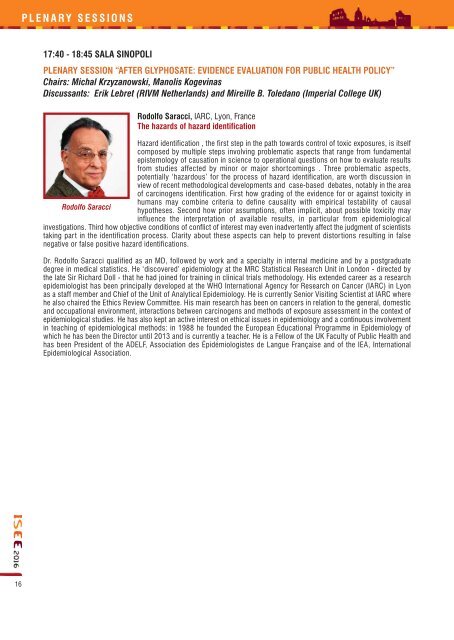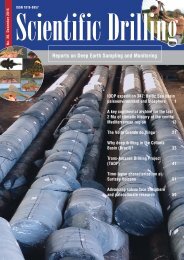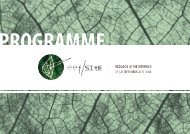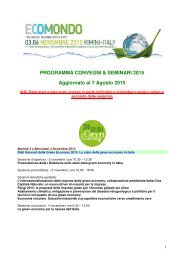Rome Italy
program-bookISEE2016
program-bookISEE2016
You also want an ePaper? Increase the reach of your titles
YUMPU automatically turns print PDFs into web optimized ePapers that Google loves.
PLENARY SESSIONS<br />
17:40 - 18:45 SALA SINOPOLI<br />
PLENARY SESSION “AFTER GLYPHOSATE: EVIDENCE EVALUATION FOR PUBLIC HEALTH POLICY”<br />
Chairs: Michal Krzyzanowski, Manolis Kogevinas<br />
Discussants: Erik Lebret (RIVM Netherlands) and Mireille B. Toledano (Imperial College UK)<br />
Rodolfo Saracci, IARC, Lyon, France<br />
The hazards of hazard identification<br />
Hazard identification , the first step in the path towards control of toxic exposures, is itself<br />
composed by multiple steps involving problematic aspects that range from fundamental<br />
epistemology of causation in science to operational questions on how to evaluate results<br />
from studies affected by minor or major shortcomings . Three problematic aspects,<br />
potentially ‘hazardous’ for the process of hazard identification, are worth discussion in<br />
view of recent methodological developments and case-based debates, notably in the area<br />
of carcinogens identification. First how grading of the evidence for or against toxicity in<br />
humans may combine criteria to define causality with empirical testability of causal<br />
Rodolfo Saracci<br />
hypotheses. Second how prior assumptions, often implicit, about possible toxicity may<br />
influence the interpretation of available results, in particular from epidemiological<br />
investigations. Third how objective conditions of conflict of interest may even inadvertently affect the judgment of scientists<br />
taking part in the identification process. Clarity about these aspects can help to prevent distortions resulting in false<br />
negative or false positive hazard identifications.<br />
Dr. Rodolfo Saracci qualified as an MD, followed by work and a specialty in internal medicine and by a postgraduate<br />
degree in medical statistics. He ‘discovered’ epidemiology at the MRC Statistical Research Unit in London - directed by<br />
the late Sir Richard Doll - that he had joined for training in clinical trials methodology. His extended career as a research<br />
epidemiologist has been principally developed at the WHO International Agency for Research on Cancer (IARC) in Lyon<br />
as a staff member and Chief of the Unit of Analytical Epidemiology. He is currently Senior Visiting Scientist at IARC where<br />
he also chaired the Ethics Review Committee. His main research has been on cancers in relation to the general, domestic<br />
and occupational environment, interactions between carcinogens and methods of exposure assessment in the context of<br />
epidemiological studies. He has also kept an active interest on ethical issues in epidemiology and a continuous involvement<br />
in teaching of epidemiological methods: in 1988 he founded the European Educational Programme in Epidemiology of<br />
which he has been the Director until 2013 and is currently a teacher. He is a Fellow of the UK Faculty of Public Health and<br />
has been President of the ADELF, Association des Épidémiologistes de Langue Française and of the IEA, International<br />
Epidemiological Association.<br />
16





